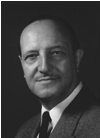Difference between revisions of "Roger Auboin"
(Created page with "{{person |WP=https://de.wikipedia.org/wiki/Roger_Auboin |birth_date=1891 |death_date=16 October 1974 |constitutes=banker |nationality=French |employment={{job |title=BIS/Gener...") |
(unstub) |
||
| (2 intermediate revisions by one other user not shown) | |||
| Line 1: | Line 1: | ||
{{person | {{person | ||
| − | | | + | |wikipedia=https://fr.wikipedia.org/wiki/Roger_Auboin |
| − | |birth_date=1891 | + | |description=Managing director of the [[Bank for International Settlements]] between [[1938]] and [[1958]]. |
| + | |birth_date=15 May 1891 | ||
| + | |birth_place=Paris | ||
|death_date=16 October 1974 | |death_date=16 October 1974 | ||
| − | |constitutes=banker | + | |death_place=Paris |
| + | |constitutes=central banker | ||
| + | |image=Roger Auboin (1891-1974).png | ||
|nationality=French | |nationality=French | ||
|employment={{job | |employment={{job | ||
| Line 10: | Line 14: | ||
|end=September 1958}} | |end=September 1958}} | ||
}} | }} | ||
| + | '''Camille Henri Roger Auboin''' was an economist and senior French civil servant, and managing director of the [[Bank for International Settlements]] between [[1938]] and [[1958]]. | ||
| + | |||
| + | ==Early life== | ||
| + | Roger Auboin was born on May 15, 1891 in Paris. He studied law and philosophy at the [[University of the Sorbonne]]<ref>https://archive.wikiwix.com/cache/?url=https%3A%2F%2Fwww.bis.org%2Fabout%2Fbiora.htm</ref>, and at [[Sciences Po]]. | ||
| + | |||
| + | ==Career== | ||
| + | He began his public career in [[1920]] at the French State Council ([[Conseil d'Etat]]). He was chief of staff of the office of French Prime Minister [[Paul Painlevé]] ([[1925]]). From [[1929]] to [[1932]], he was the resident technical adviser of the Bank of France mission with the National Bank of [[Romania]] in [[Bucharest]], advising on the implementation of a monetary and financial stabilisation programme. He became a member of the General Council of the [[Bank of France]] in [[1937]].<ref>https://www.bis.org/about/biora.htm</ref> | ||
| + | |||
| + | Auboin was a columnist for ''L'Europe nouvelle'', the journal of [[Louise Weiss]] , where [[Robert Marjolin]] also writes. | ||
| + | |||
| + | ==Bank for International Settlements== | ||
| + | Roger Auboin was then appointed in [[1938]] as Director of the [[Bank for International Settlements]], a position he held until [[1958]]<ref>http://www.bis.org/about/formerofficials.htm [https://archive.wikiwix.com/cache/?url=http%3A%2F%2Fwww.bis.org%2Fabout%2Fformerofficials.htm archive]</ref> replacing [[Pierre Quesnay]], and became one of the participants in the [[Walter Lippmann]] colloquium. | ||
| + | |||
| + | As Director of the BIS, Aubouin made a serious misinterpretation on March 15, 1939, by authorizing the transfer of [[Czechoslovakian]] [[gold]] deposited in [[London]] to the [[Reichsbank]], while Czechoslovakia was invaded by the armies of [[Nazi Germany]]. The evidence is in the archives of the BIS and partly in those of the [[Bank of France]]. In August [[1944]], in retaliation, London and Washington decided to abolish the BIS, which was defended by [[John Maynard Keynes]]. Ultimately, the BIS regained its sovereignty in [[1948]].<ref>http://www.bis.org/about/1930s.htm [https://archive.wikiwix.com/cache/?url=http%3A%2F%2Fwww.bis.org%2Fabout%2F1930s.htm archive]</ref><ref>https://www.princeton.edu/~ies/IES_Essays/E192.pdf [https://archive.wikiwix.com/cache/?url=https%3A%2F%2Fwww.princeton.edu%2F~ies%2FIES_Essays%2FE192.pdf archive]</ref> | ||
| + | |||
| + | At his death, he was vice-president of the [[Société d'économie politique]]<ref>http://www.numdam.org/article/JSFS_1975__116__318_0.pdf http://www.numdam.org/article/JSFS_1975__116__318_0.pdf archive]</ref> | ||
| + | |||
{{SMWDocs}} | {{SMWDocs}} | ||
==References== | ==References== | ||
{{Reflist}} | {{Reflist}} | ||
| − | |||
Latest revision as of 22:43, 31 March 2022
(central banker) | ||||||||||||||
|---|---|---|---|---|---|---|---|---|---|---|---|---|---|---|
 | ||||||||||||||
| Born | 15 May 1891 Paris | |||||||||||||
| Died | 16 October 1974 (Age 83) Paris | |||||||||||||
| Nationality | French | |||||||||||||
Managing director of the Bank for International Settlements between 1938 and 1958.
| ||||||||||||||
Camille Henri Roger Auboin was an economist and senior French civil servant, and managing director of the Bank for International Settlements between 1938 and 1958.
Contents
Early life
Roger Auboin was born on May 15, 1891 in Paris. He studied law and philosophy at the University of the Sorbonne[1], and at Sciences Po.
Career
He began his public career in 1920 at the French State Council (Conseil d'Etat). He was chief of staff of the office of French Prime Minister Paul Painlevé (1925). From 1929 to 1932, he was the resident technical adviser of the Bank of France mission with the National Bank of Romania in Bucharest, advising on the implementation of a monetary and financial stabilisation programme. He became a member of the General Council of the Bank of France in 1937.[2]
Auboin was a columnist for L'Europe nouvelle, the journal of Louise Weiss , where Robert Marjolin also writes.
Bank for International Settlements
Roger Auboin was then appointed in 1938 as Director of the Bank for International Settlements, a position he held until 1958[3] replacing Pierre Quesnay, and became one of the participants in the Walter Lippmann colloquium.
As Director of the BIS, Aubouin made a serious misinterpretation on March 15, 1939, by authorizing the transfer of Czechoslovakian gold deposited in London to the Reichsbank, while Czechoslovakia was invaded by the armies of Nazi Germany. The evidence is in the archives of the BIS and partly in those of the Bank of France. In August 1944, in retaliation, London and Washington decided to abolish the BIS, which was defended by John Maynard Keynes. Ultimately, the BIS regained its sovereignty in 1948.[4][5]
At his death, he was vice-president of the Société d'économie politique[6]
Event Participated in
| Event | Start | End | Location(s) | Description |
|---|---|---|---|---|
| Walter Lippmann Colloquium | 26 August 1938 | 28 August 1938 | Paris France | Twenty-six of the most prominent liberal thinkers attended this a 1938 conference. The aim was to construct a new liberalism as a rejection of collectivism, socialism and laissez-faire liberalism. |
References
- ↑ https://archive.wikiwix.com/cache/?url=https%3A%2F%2Fwww.bis.org%2Fabout%2Fbiora.htm
- ↑ https://www.bis.org/about/biora.htm
- ↑ http://www.bis.org/about/formerofficials.htm archive
- ↑ http://www.bis.org/about/1930s.htm archive
- ↑ https://www.princeton.edu/~ies/IES_Essays/E192.pdf archive
- ↑ http://www.numdam.org/article/JSFS_1975__116__318_0.pdf http://www.numdam.org/article/JSFS_1975__116__318_0.pdf archive]